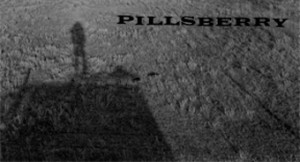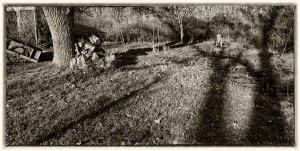My parents both had a controlled temperament. Father was an engineer and served two operational tours with the RCAF in WW II. Mother lived in Coventry when the Blitz leveled the city. So as parents they were dutiful and kind but there was an expectation of excellence that was rewarded with a complement and a handshake, not a hug, I attributed the coolness to pragmatism and personal histories that had seen a lot of death and destruction. Personal displays of emotion were not frequent and whiners were not appreciated.
So, one spring day father decided we were going to clean up the yard. Rake up and burn all the detritus that had fallen over winter as well as all assorted [burnable] junk around. Becausehe suffered from emphysema and he had to take frequent rests when doing heavy yard work like this. Conveniently, he positioned the little wooden chair pictured nearby his jobs to sit on and catch his breath. It had survived from a kitchen set that stretched far back in our personal family history to when I was a child.
Because the chair simply sat out in the weather year after year, it had deteriorated to the point where a few days earlier it had collapsed when moved such that it was irreparable [or so I thought. My woodworking skills have since improved to where I now recognize that the crumpled seat could have been re-doweled and re-glued]. So it sat [as pictured] unusable by my father. One following morning, I was up early, [or more probable, still up from the previous evening], took the camera into the back yard and made this image. I then started to burn stuff and, unfortunately, used the chair as starter kindling as it was now, in my mind, ‘burnable junk’.
My father was also an early riser [a Saskatchewan farmboy whose job was to get the horses ready for the day]. He would always have bacon and eggs and toast. The last mouthful of toast, slathered in egg yoke, was reserved for Tini, the family dog. A white floor mop of mixed miniature poodle and Chihuahua whose routine was to sit patiently until the last mouthful was imminent and [regardless of the fact that she was never, ever forgotten about] rise to place a paw on father’s thigh just to remind him whose mouthful that was.
When father came out I sauntered up expecting some praise for my early morning ambition. Instead, he immediately noticed the chairs absence and enquired where it was. When I told him its fate, he started [ which was an unusual expression of emotion for him] and his face took on a countenance that was both pained and patient. He put his hands on his hips and said, quite simply, “I always liked that chair. We had grown old together.” Staring into the fire, the sentiment lasted but a second and then he asked if there was anything else left to do and the moment was gone and never mentioned again.
But as you can see it has not been forgotten. That singular moment made me sensitive to the odd attachments we humans make to seemingly unimportant things and I now never deride anyone’s affection for that ‘odd’ earring or broken bit of pottery. It has embedded itself in a piece of our emotional history that only our individual memories can give importance to. Its inert objectiveness is given life by our lives, in our lives, and I suspect, we die a little when it disappears.
So treasure them as I treasure this photograph. Live a little longer


